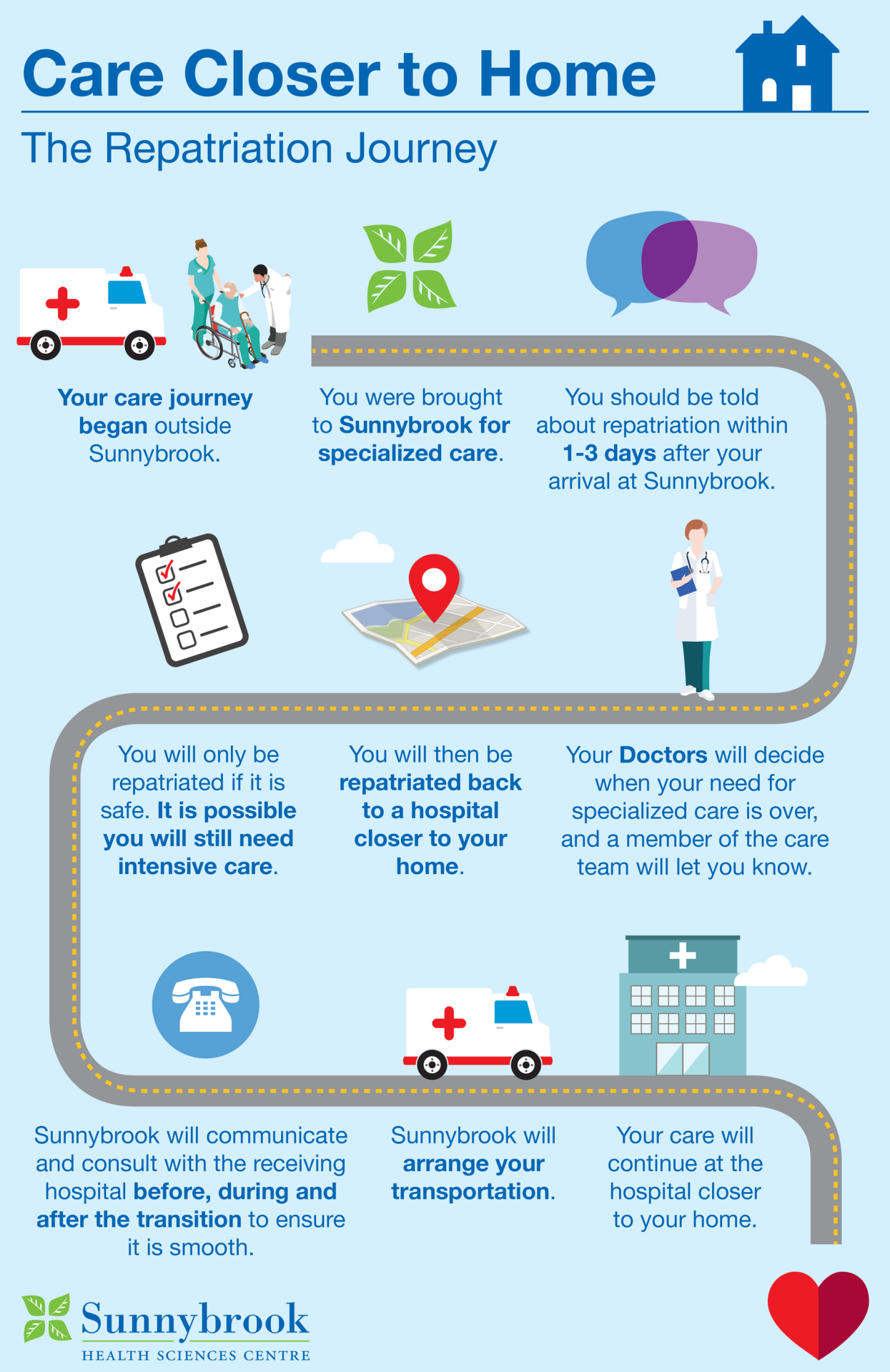Frequently Asked Questions
Below you will find the answers to some of the common questions you may face regarding your repatriation journey.

View a plain-text version of the infographic »
Care closer to home: the repatriation journey
- Your care journey began outside Sunnybrook
- You were brought to Sunnybrook for specialized care
- You should be told about repatriation within 1-3 days after your arrival at Sunnybrook
- You will only be repatriated if it is safe. It is possible you will still need intensive care
- You will then be repatriated back to a hospital closer to your home
- Your doctors will decide when your need for specialized care is over, and a member of the care team will let you know
- Sunnybrook will communicate and consult with the receiving hospital before, during and after the transition to ensure it it smooth
- Sunnybrook will arrange your transportation
- Your care will continue at the hospital closer to your home
What does Repatriation mean?
Repatriation can occur under a number of circumstances. It is the process of returning patients from Sunnybrook to a hospital that is closer to their home. It applies to patients who came to Sunnybrook for specialized care they could not receive locally.
When does Repatriation occur?
Repatriation happens as soon as the need for specialized care (or "tertiary" care) is over. This will be determined by the physician in charge of the patient’s care.
What is "tertiary" care?
Tertiary care is a higher level of care that involves very specialized equipment and expertise. Tertiary care is usually provided by an academic teaching hospital or large community hospital with access to specialists. Patients will often be referred from smaller hospitals to a tertiary hospital for major operations, consultations with sub-specialists, and when intensive care facilities are needed.
Why do I have to be Repatriated? Why can’t I stay at Sunnybrook to finish my care?
We understand that transfer of care from one hospital to another can be very stressful to patients and families. Repatriation ensures that we are delivering the right level of care to patients who need it the most at the right time.
The hospital I’m going back to is not the one closest to my home. Why?
Patients will go back to the hospital that is best able to care for them or is designated to care for them.
Who coordinates Repatriation at Sunnybrook?
Repatriation is a team effort that involves our Repatriation Office, the physician(s) in charge of the patient’s care, the unit’s Patient Care Manager, Patient Care Coordinators, Charge Nurses/Team Leaders, and the interprofessional team. The entire care team plays a role in communicating with the patient and family along the way.
How will I know when I am being Repatriated?
The patient/family should be told by a member of their care team that he or she is eligible for Repatriation in the first day or two after arrival at Sunnybrook. It might not be known yet what day the patient will go to their “close to home” hospital, as that will depend on their condition and when they are clinically ready. Sunnybrook will provide support along the way by keeping the patient and family informed on their progress. You should receive regular updates from the care team.
What is the process after I am placed on the Repatriation list?
Sometimes it can take a little while to ensure all the pieces are in place before the patient is repatriated. This includes waiting for a bed to become available at the receiving hospital and ensuring the team there is ready for the patient.
On the other hand, this process can sometimes happen quickly, and the patient may be notified that they are being repatriated on the same day.
In the process of repatriation, there will be full team input in terms of recommendations for therapies, family supports, liaising with private providers, access to specialized resources so that optimal care goals are achieved.
Is it safe to be Repatriated?
Repatriation can occur at any point in the hospital journey, but will only occur when the patient can be transferred safely and the patient’s medical needs can be met elsewhere. Sunnybrook and the receiving hospital will be in communication about the patient’s status throughout the process.
Patients who are still in the Intensive Care Unit (ICU) can be repatriated if their tertiary care is complete.
How will I get to the other hospital?
Safe transportation to the hospital closer to the patient’s home will be arranged by Sunnybrook according to the patient’s medical needs, and level of care required. This may include ambulance or private transport providers.
Can patients or families refuse Repatriation?
Repatriation allows us to deliver specialized care to the patients who need it most. Patients and families cannot refuse Repatriation; however, we will work with you to make the transition as smooth as possible.
Who do I talk to if I have more questions about Repatriation?
Please speak with a member of the care team such as a Charge Nurse, a Patient Care Coordinator, or the Patient Care Manager if there are further questions about this process.






